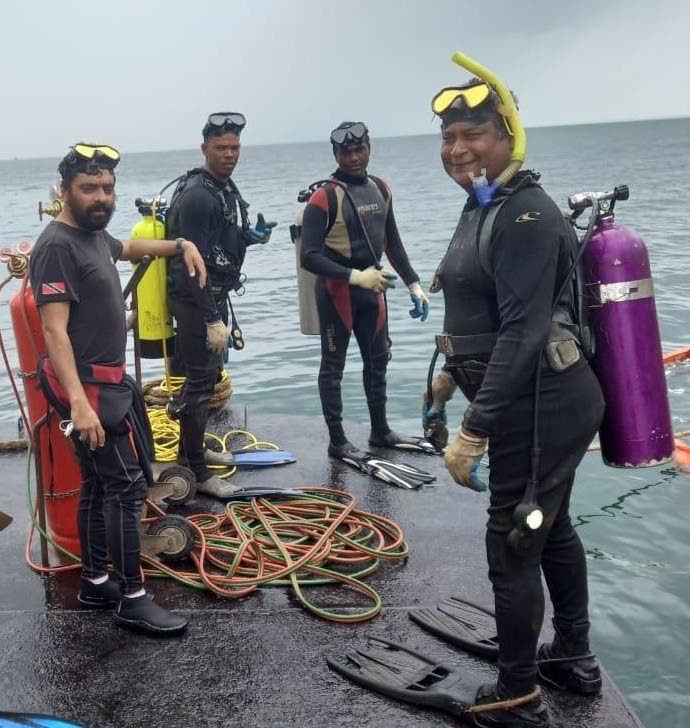Chairman of enquiry hopes Paria report will improve diving safety standards

Chairman of the Commission of Enquiry (CoE) into the Paria diving tragedy Jerome Lynch hopes the commission’s eventual report would improve local diving safety standards.
After two months of public hearings which probed the planning and oversight of repairs, causation of accident and efficacy of rescue efforts, with lawyers for interested parties seeking to minimise their clients liability, the enquiry came to an end on Friday with the closing submissions of counsel to the enquiry Ramesh Maharaj.
Last February, LMCS divers Fyzal Kurban, Kazim Ali Jr, Rishi Nagassar, Yusuf Henry and Christopher Boodram were sucked into a 30-inch undersea pipeline by a surge in water pressure called a Delta P. Only Boodram escaped alive while his four colleagues died while trapped in the pipeline.
Before Christmas, Boodram testified to the “unbelievable nightmare” of being trapped in the pipeline, and of the colleague’s valiant efforts to “pull and drag” to escape.
“Your eyes burning. Pitch black – you can’t see anything. Your throat burning. Your ears ringing. Your body sore.”

The CoE heard an audio recording of the victims in the pipeline encouraging each other to stay alive. Boodram said keeping everyone calm was “the hardest thing I’ve ever done in my life.”
Michael Wei, Paria technical and maintenance manager, said rescuers lives should not be risked in unknown pipeline conditions, possibly facing a second Delta P event.
“To send someone into the line without knowing that would be reckless.”
Collin Piper, Paria terminal operations manager, stood by decision not to risk more lives in unofficial rescue efforts, including Michael Kurban wishing to save his father.
“If I was the father in that pipe, would I want somebody to send my son into that pipe after me in a reckless manner where he could perish?
“And every time I ask myself that question, my answer was no. I would not want anybody to be so reckless with my son’s life.
Ali’s mother, Catherine Ali, complained to the CoE on January 9.
“There was no leadership, preparedness or morality in Paria’s decisions that she believed led to the deaths of four LMCS divers who waited excruciatingly in the pipe until they could breathe no more.
“It was wrong to bar a father from saving his son and wrong to bar Michael Kurban from saving his father. All four LMCS men have families and friends who love them.”
Lynch on January 4 hit Paria’s treatment of worried families while the men remained trapped undersea, disclosed in testimony by Nagassar’s wife, Vanessa Kussie.
“Just to reflect for a moment on what she said. She is at Paria attempting to find out what’s going on, and apparently no one’s telling anybody anything.
“They are resorting to have to be stopping cars entering and/or leaving the premises to find out what’s happening. On any view not an acceptable position, is it?”
At that hearing, Paria terminal manager Mushtaq Mohammed testified, “There was a method LMCS was suggesting. I’d not call it a rescue plan.”
Regarding causation, on January 6 Paria HSE manager Randolph Archibald testified Kenson technician Houston Marjadsingh was in theory competent enough to stop LMCS workers from removing a plug which likely triggered a Delta P causing their deaths, although he did not.
Rolph Seales, dive supervisor at Heritage Petroleum Company Ltd, on January 7 said a rescue would have been very complex.
“You are going down the vertical section. When you reach the horizontal you navigate the tube turn. That might pose a little challenge, with equipment on.
“He’d have to turn over, on all-fours. So you’d have to have to be on your belly now, in the horizontal section. You’d need to be on your stomach to be able to travel along the pipeline.”
Seales said trapped men could endanger rescuers. “He’s in survival mode now. He could be erratic. You can be attacked. He might try to take your gear.”
Lynch surmised a rescue was difficult but not impossible.
Paria HSE co-ordinator Paul Yearwood on January 6 claimed safety improvements had been made at Paria since the accident but nothing addressing any Delta P hazard.
Lynch lamented, “So if this (accident) were to happen again, I think the same IMT (incident management team) would be convened, utilising the same people, utilising the same procedures.”

Counsel for various parties made arguments and recommendations this past week, following the terms of reference (TORs) to examine Paria’s “policy, procedure, practices and conduct” and LMCS’s “plan of works, equipment and safeguards.”
The TORs included, “To identify the precise facts and circumstances which led up to, and resulted in, the loss of life and whether this was reasonable and justifiable in the particular circumstances.
“To identify, whether by act or omission, any identified or unidentified party, directly or indirectly, caused loss of life.”
Nyree Alfonso, SWWTU counsel, urged mandatory safety standards for TT’s commercial diving sector which could have averted the tragedy, or facilitated the divers’ rescue.
“LMCS’s diving supervisor admitted that, had the divers, at minimum, been harnessed by rope which could have been attached to their respective hips, then when the Delta P event occurred they could have been retrieved immediately, and we would not be here today.”
Alfonso claimed LMCS divers had triggered the Delta P event.
“By removing an unquantified amount of line content (water and oil) in sealine 36 and introducing air into the line, LMCS created the environment for the differential pressures to exist which ultimately led to the Delta P event which caused the five divers to be stuck in the pipeline.
“Even though LMCS was a well-experienced contractor, they failed to recognise the inherent risk to their divers in removing the habitat and the decommissioning of the air compressor that was pumping oxygen into same and for that matter removing the flange at berth five.”




Comments
"Chairman of enquiry hopes Paria report will improve diving safety standards"